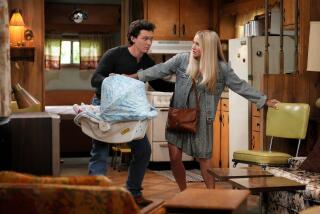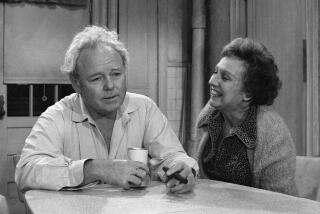Smashing Sitcom Myths
- Share via
Like most baby boomers, Gerald Jones grew up watching television--especially sitcoms.
“In my childhood I was fond of them for some reason,” he said. At certain points in his youth, Jones said, he was especially fond of “Leave It To Beaver.”
Jones, 35, is the author of the book “The Beaver Papers,” a satire of the sitcom and modern literature. “There was a period before I was 16 when ‘Bewitched’ had a hold on me and ‘The Andy Griffith Show’ and ‘Dick Van Dyke.’ ”
Yet Jones was ambivalent to the world of sitcoms. As Jones grew up, he realized there was something “creepy” in the way sitcoms portrayed the world. “They created this perfect family world.”
Ergo his new book, which is already receiving good reviews: “Honey, I’m Home! Sitcoms: Selling the American Dream” (Grove Weidenfeld, $24.95).
“Honey, I’m Home!” explores the social history of the situation comedy from its roots in radio (early TV series “Amos ‘n’ Andy” and “The Goldbergs” originated on radio), through the Golden Age of sitcoms such as “I Love Lucy,” to contemporary hits such as “The Cosby Show” and “The Simpsons.”
In a recent interview, Jones said the ‘50s wasn’t the wholesome, innocent, carefree time depicted in the era’s popular family sitcoms, most notably “Leave It to Beaver” and “Father Knows Best.”
“It was a revolutionary period in American culture,” Jones said. “We were going through an incredible number of stresses and fears. At the same time, mass culture was trying to create an image of what we could be. That’s what pops up in ‘Father Knows Best’ and ‘Beaver.’ I do not think these were reflections of the time. They weren’t meant to be as such, but were pictures, sort of instructional books, on the kind of world we could create if we kept going in the same direction.”
In short, Jones said, sitcoms were a plan for the perfect society. “It was a way to use postwar prosperity and America’s dominant position to forge this ideal world, especially ‘Father Knows Best,’ ” Jones said. “It was almost a blueprint. Producers and writers seemed to feel this is what the world should be. They had a lot of government endorsement.”
These series still endure in repeats, Jones said, because they are a pleasant escape from the stresses of contemporary life. “There is a retreat there,” he said. “Because we don’t know our history that well, it is easy to believe the ‘50s were like that. It is almost more real now than it was back then.”
Jones said he has grown to appreciate such “trash” sitcoms such as “The Beverly Hillbillies” and “Green Acres.”
“I found that buried under the laugh tracks and gags was fairly intelligent humor,” he said. “There were things going on I was kind of missing as a kid. They did a lot of interesting stuff with nonsensical verbal humor. Paul Henning, who co-created both shows, was a radio comedy writer in the 1930s and ‘40s. They have that same kind of sensibility--the weird rambling speech and characters who have a distorted view of the universe.”
Jones said sitcoms still are “very much pro-mainstream and for the consumer society.” Fox’s irreverent “The Simpsons” is an exception to the rule. “It is not quite heavy social satire, but it pushes it as far as it goes,” he said. “Most of the Fox shows are willing to take a more antagonistic attitude.”
But, he said, he believes “The Simpsons” has lost some of its caustic edge. “They have gotten a little bit sweeter,” he said. “I think it may be the nature of the sitcom form. There is something about the form that gets sweeter and sweeter as it goes along.”
Since he finished the book, Jones has watched very little television.
“I’m finding I am not too fond of what they call ‘quality television,’ ” he said. “Trash TV reveals more about the world than quality shows do when they are trying too hard. Even things like ‘Murphy Brown,’ which I see at one level is well done, you really can’t watch because it tries too hard. I have been watching ‘Northern Exposure’ about every other week. It is quirky and fun. Things like that wake me up.”
More to Read
Sign up for our Book Club newsletter
Get the latest news, events and more from the Los Angeles Times Book Club, and help us get L.A. reading and talking.
You may occasionally receive promotional content from the Los Angeles Times.











